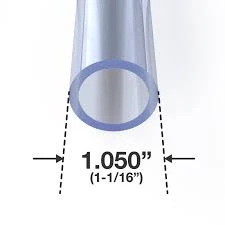డిసెం . 02, 2024 01:28 Back to list
hdpe sewer pipe
The Role of HDPE Sewer Pipes in Modern Infrastructure
High-Density Polyethylene (HDPE) pipes have increasingly become a crucial component in the realm of sewage and wastewater management. With the ever-growing focus on sustainability and efficiency in urban planning and construction, HDPE sewer pipes present a wide array of benefits that make them an attractive alternative to traditional materials. This article delves into the characteristics, advantages, and applications of HDPE sewer pipes in modern infrastructure.
What is HDPE?
High-Density Polyethylene is a thermoplastic polymer made from petroleum. Known for its high strength-to-density ratio, HDPE is applicable in various industries, including packaging, construction, and groundwater management. The production and processing of HDPE allow for flexibility and durability, which is why it is particularly well-suited for sewer pipes. Its lightweight nature also contributes to ease of transportation and installation.
Characteristics of HDPE Sewer Pipes
HDPE sewer pipes are defined by several key characteristics that set them apart from conventional materials such as concrete or clay. These pipes boast excellent chemical resistance, making them suitable to transport wastewater with a variety of acidic and alkaline substances without undergoing significant deterioration. Additionally, HDPE's non-corrosive composition means that it will not rust or corrode over time, extending the lifespan of the sewer system.
Moreover, HDPE pipes exhibit remarkable flexibility, allowing them to withstand ground movement and pressure from surrounding soil. This is particularly advantageous in regions prone to seismic activity or soil subsidence. Furthermore, due to their smooth interior surfaces, HDPE pipes minimize friction and prevent buildups of solids, which enhances the flow of wastewater.
Advantages of HDPE Sewer Pipes
hdpe sewer pipe

One of the most significant advantages of HDPE sewer pipes is their longevity. With a typical lifespan of over 50 years, these pipes can significantly reduce maintenance costs commonly associated with traditional sewer systems. Their durability and resistance to environmental stressors translate into less frequent replacements, saving municipalities time and money.
Another considerable benefit of HDPE pipes is their low environmental impact during production and installation. The lighter weight of HDPE reduces the energy required for transportation, and its flexibility often means that trenchless installation methods can be employed. Techniques such as horizontal directional drilling minimize disruption to the surrounding environment, preserving existing landscapes and reducing the carbon footprint associated with construction activities.
HDPE pipes also allow for a reduction in wastewater treatment costs. Their chemical resistance and smooth flow properties lead to less buildup and easier cleaning processes. Consequently, treatment facilities can operate more efficiently, which is vital in the face of growing urban populations.
Applications in Modern Infrastructure
The use of HDPE sewer pipes is widespread across various sectors, from municipal sewer systems to industrial wastewater management. In urban areas, cities are increasingly opting for HDPE solutions to upgrade aging infrastructure, thereby improving service reliability and reducing the likelihood of leaks and spills.
Moreover, HDPE pipes find utility in agricultural drainage systems, where they can effectively manage surplus water and help prevent soil erosion. In stormwater management, these pipes can be incorporated into systems designed to control flooding and mitigate runoff.
Conclusion
In conclusion, HDPE sewer pipes are revolutionizing wastewater management in urban infrastructure. Their unique properties, such as durability, flexibility, and resistance to corrosion, make them a superior choice compared to traditional materials. As cities grapple with the challenges of aging infrastructure and increasing environmental regulations, the persistent advantages of HDPE will likely lead to further adoption in the future. Embracing HDPE sewer technology not only improves the efficiency and reliability of sewage systems but also contributes to a more sustainable approach to modern urban development. The future of wastewater management looks brighter with HDPE leading the way.
-
High-Quality PPR Pipes and Fittings Durable ERA PPR & PVC PPR Solutions
NewsJul.08,2025
-
Black HDPE Cutting Board - Durable, Non-Porous & Food Safe HDPE Plastic Cutting Board
NewsJul.08,2025
-
High-Quality CPVC Panel Durable HDPE & PVC Panels Supplier
NewsJul.08,2025
-
Double PE Welding Rod Supplier - High Strength, Durable & Versatile Welding Solutions
NewsJul.07,2025
-
High-Quality PVC-O Pipe Supplier Durable 75mm PVC Pipe & Connections Leading PVC Pipe Company
NewsJul.07,2025
-
HDPE Drainage Pipe Supplier – Durable & Corrosion-Resistant Solutions
NewsJul.06,2025

